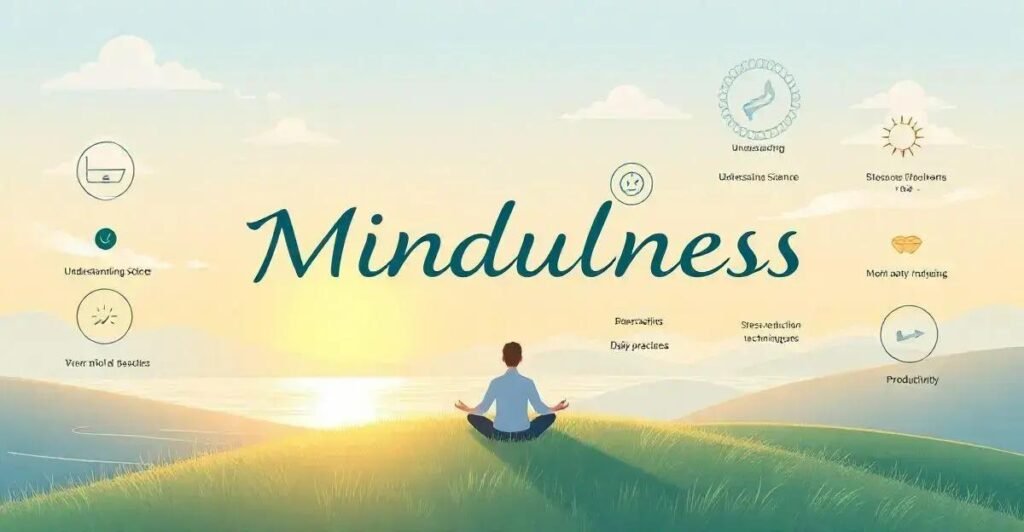In today’s fast-paced world, it’s easy to get caught up in the hustle and bustle and lose focus on what’s truly important.
Mindfulness is the practice of being present in the moment, without judgment, and it’s revolutionizing the way we approach mental wellness.
By incorporating mindfulness into your daily routine, you can boost your mental clarity, improve your mood, and enhance your overall well-being.
In this article, we’ll explore the benefits of mindfulness, provide tips for getting started, and discuss how to make it a sustainable part of your daily life.
Table of Contents
Mindfulness 101: An Introduction to the Practice
Mindfulness is the practice of being fully present and engaged in the current moment, while cultivating a non-judgmental awareness of one’s thoughts, feelings, and bodily sensations.
The concept of mindfulness has its roots in ancient Eastern spiritual traditions, but has been adapted and secularized for modern Western audiences.
With the increasing recognition of the benefits of mindfulness, it is now being used in a wide range of settings, from healthcare and education to business and sports.
By incorporating mindfulness into your daily routine, you can experience a range of benefits, including reduced stress and anxiety, improved sleep, and increased focus and productivity.
The Science Behind Mindfulness: How it Affects Your Brain

Mindfulness has been shown to have a significant impact on the brain, with studies demonstrating changes in areas such as the amygdala, prefrontal cortex, and hippocampus.
When we practice mindfulness, we are able to rewire our brains to respond to stress and anxiety in a more adaptive way.
This can lead to a range of benefits, including reduced symptoms of depression and anxiety, improved sleep quality, and increased gray matter in areas of the brain associated with attention and emotion regulation.
In addition, mindfulness has been linked to increased activity in areas of the brain associated with attention, memory, and problem-solving, which can improve cognitive function and overall well-being.
Mindfulness Exercises for Stress Relief and Anxiety
Mindfulness exercises can be a powerful tool for reducing stress and anxiety, and can be practiced anywhere, at any time.
One of the most effective mindfulness exercises for stress relief is the ‘body scan’, which involves bringing awareness to different parts of the body, starting from the toes and working up to the top of the head. This can help to release physical tension and promote relaxation.
Another effective exercise is the ‘4-7-8 breathing technique’, which involves breathing in through the nose for a count of 4, holding the breath for a count of 7, and breathing out through the mouth for a count of 8. This can help to slow down the heart rate and promote relaxation.
Mindfulness exercises can also be used to manage anxiety by focusing on the present moment and letting go of worries about the past or future.
Mindfulness in Everyday Life: How to Make it a Habit

Making mindfulness a habit requires intentional effort, but the benefits are well worth it.
Start by setting aside a few minutes each day to practice mindfulness, whether it’s through meditation, deep breathing, or simply paying attention to your senses.
Consistency is key, so try to make mindfulness a part of your daily routine, such as right after waking up or before bed.
You can also incorporate mindfulness into your daily activities, such as eating or walking, by paying attention to your senses and letting go of distractions.
Additionally, find a mindfulness buddy or join a mindfulness group to help keep you motivated and accountable.
With time and practice, mindfulness can become an automatic response to stress and anxiety, leading to a greater sense of calm and well-being.
Mindfulness and Mental Health: The Connection
The connection between mindfulness and mental health is well established, with numerous studies demonstrating the positive effects of mindfulness on both physical and mental well-being.
Mindfulness has been shown to reduce symptoms of anxiety and depression, improve sleep quality, and increase self-awareness and self-acceptance.
Additionally, mindfulness has been linked to increased gray matter in areas of the brain associated with attention and emotion regulation, as well as reduced activity in areas associated with stress and anxiety.
By incorporating mindfulness into daily life, individuals can develop greater resilience and better coping strategies for managing the stresses of everyday life, leading to improved overall mental health and well-being.
Conclusion: Elevate Your Mindfulness Practice for a Happier You

Elevating your mindfulness practice to achieve a happier you requires commitment and consistency. Start by setting aside dedicated time each day for mindfulness practice, whether it’s meditation, deep breathing, or simply paying attention to your senses.
Make mindfulness a part of your daily routine, such as right after waking up or before bed. Additionally, find ways to incorporate mindfulness into your daily activities, such as eating or walking, by paying attention to your senses and letting go of distractions.
By making mindfulness a habit, you can develop greater resilience, better coping strategies, and improved overall mental health and well-being. Remember, mindfulness is a journey, not a destination, and with consistent practice, you can cultivate a greater sense of calm, clarity, and happiness in your daily life.
Frequently Asked Questions about Mindfulness
What is the purpose of mindfulness?
Mindfulness is the practice of being present in the moment, without judgment, and cultivating a non-judgmental awareness of one’s thoughts, feelings, and bodily sensations.
How can I incorporate mindfulness into my daily routine?
Start by setting aside dedicated time each day for mindfulness practice, whether it’s meditation, deep breathing, or simply paying attention to your senses.
Can mindfulness help with stress and anxiety?
Yes, mindfulness has been shown to reduce symptoms of stress and anxiety by teaching individuals to focus on the present moment and let go of worries about the past or future.
What are some benefits of mindfulness?
Mindfulness has been linked to a range of benefits, including reduced stress and anxiety, improved sleep quality, increased self-awareness and self-acceptance, and greater resilience and coping strategies.
Is mindfulness a part of mental health treatment?
Yes, mindfulness is often used as a complementary therapy for mental health conditions such as depression, anxiety, and post-traumatic stress disorder (PTSD).
Can I practice mindfulness anywhere?
Yes, mindfulness can be practiced anywhere, at any time, and in any situation. It’s a skill that can be developed with practice and patience.



